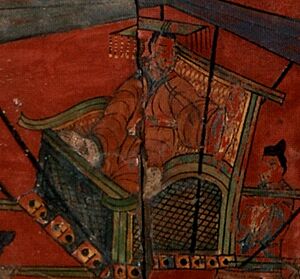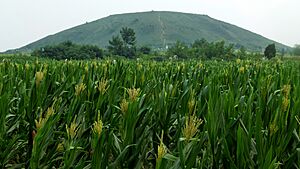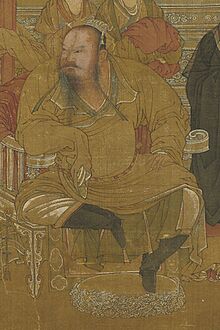Emperor Cheng of Han facts for kids
Quick facts for kids Emperor Cheng of Han |
|||||||||
|---|---|---|---|---|---|---|---|---|---|

Emperor Cheng riding a palanquin, Northern Wei painted screen (5th century)
|
|||||||||
| Emperor of the Han dynasty | |||||||||
| Reign | 4 August 33 BC–17 April 7 BC | ||||||||
| Predecessor | Emperor Yuan | ||||||||
| Successor | Emperor Ai | ||||||||
| Born | 51 BC Chang'an, Han Empire |
||||||||
| Died | 17 April 7 BC (aged 44) Chang'an, Han Empire |
||||||||
| Burial | Yan Mausoleum (延陵) | ||||||||
| Consorts | Xu Kua Empress Xiaocheng |
||||||||
|
|||||||||
| House | Liu | ||||||||
| Dynasty | Han (Western Han) | ||||||||
| Father | Emperor Yuan | ||||||||
| Mother | Empress Xiaoyuan | ||||||||
| Emperor Cheng of Han | |||||||||||||||||||
|---|---|---|---|---|---|---|---|---|---|---|---|---|---|---|---|---|---|---|---|
| Traditional Chinese | 漢成帝 | ||||||||||||||||||
| Simplified Chinese | 汉成帝 | ||||||||||||||||||
| Literal meaning | The Accomplished Emperor of Han | ||||||||||||||||||
|
|||||||||||||||||||
| Alternative Chinese name | |||||||||||||||||||
| Traditional Chinese | 劉驁 | ||||||||||||||||||
| Simplified Chinese | 刘骜 | ||||||||||||||||||
| Literal meaning | (personal name) | ||||||||||||||||||
|
|||||||||||||||||||
Emperor Cheng of Han, whose personal name was Liu Ao (born 51 BC, died 7 BC), was an important emperor of the Chinese Han dynasty. He ruled from 33 BC to 7 BC. He took over the throne after his father, Emperor Yuan. During his time, his mother's family, the Wang clan, gained a lot of power in the government. This led to some problems for the empire. Emperor Cheng ruled for 26 years but did not have any children who survived him. His nephew, Emperor Ai, became the next emperor.
Contents
Early Life & Crown Prince Years
Emperor Cheng, whose personal name was Liu Ao, was born around 51 BC. His father was Crown Prince Liu Shi, who later became Emperor Yuan. His mother was Consort Wang, who became known as Grand Empress Dowager Wang Zhengjun. Liu Ao was the first son born to Emperor Yuan.
Becoming Crown Prince
On June 17, 47 BC, Emperor Yuan officially named Liu Ao as the Crown Prince. This meant he was chosen to be the next emperor.
Challenges to His Position
Emperor Yuan had two other favorite concubines besides Empress Wang. They were Consort Fu and Consort Feng Yuan. Each of these women had a son with the emperor. Empress Wang tried to get along with both of them.
However, Consort Fu wanted her son, Prince Kang of Dingtao, to be the next emperor instead of Liu Ao. Emperor Yuan also started to have doubts about Liu Ao's ability to rule. He was more impressed with Prince Kang.
One time, in 35 BC, Emperor Yuan's younger brother, Prince Liu Jing, passed away. Emperor Yuan was upset because he felt that Crown Prince Ao was not grieving enough. Prince Ao and Prince Jing were similar in age and had grown up together. A trusted official named Shi Dan helped convince Emperor Yuan that Prince Ao was just trying to help his father not grieve too much. But the emperor's doubts remained.
Emperor Yuan's Choice
As the princes grew older, Emperor Yuan and Prince Kang became very close. They both loved music and playing drums. When Emperor Yuan became very sick around 35 BC, Consort Fu and Prince Kang were often called to his side. Empress Wang and Crown Prince Ao were rarely there.
During his illness, Emperor Yuan thought about making Prince Kang his heir. Consort Fu encouraged this idea. But Shi Dan, the trusted official, stepped in again. He convinced Emperor Yuan to stick with Crown Prince Ao. When Emperor Yuan died in 33 BC, Crown Prince Ao became Emperor Cheng.
The Wang Clan's Growing Power
After Emperor Yuan died, Emperor Cheng's mother, Empress Wang, became the empress dowager. Prince Kang, who had been considered for the throne, was sent to rule his own area in Dingtao. Even though Consort Fu and Prince Kang had tried to get the throne, Emperor Cheng and Empress Wang did not hold a grudge. Emperor Cheng often invited Prince Kang to the capital city, Chang'an.
Uncles in Power
Emperor Cheng trusted his uncles, who were Empress Dowager Wang's brothers. He gave them very important jobs in the government. His oldest uncle, Wang Feng, was already a marquess. Six more of Empress Dowager Wang's brothers were also made marquesses. This was against an old rule set by Emperor Gao, who founded the Han dynasty. That rule said only people who had greatly helped the empire could become marquesses.
Several members of the Wang family held the top position in the military and effectively controlled the government:
- Wang Feng, from 33–22 BC
- Wang Yin, from 22–15 BC
- Wang Shang, from 15–12 BC
- Wang Gen, from 12–8 BC
- Wang Mang, from 8–7 BC
The Wang family members were not always corrupt. Some of them truly tried to help the emperor. However, many of them were more interested in gaining power for their family. They did not always choose the best officials for government jobs. This caused the empire's administration to get worse. Emperor Cheng sometimes thought about changing this power system but never managed to do so.
For example, in 24 BC, Emperor Cheng thought about replacing Wang Feng with a respected official named Feng Yewang. Feng Yewang was the brother of his father's concubine, Consort Feng. When Wang Feng found out, Empress Dowager Wang became very upset. As a result, Emperor Cheng had the official who suggested the change executed. He also removed Feng Yewang from his position, even though Feng Yewang had done nothing wrong.
The Search for an Heir
Emperor Cheng had many favorite consorts. His first favorite was Empress Xu. He also liked Consort Ban. However, neither Empress Xu nor Consort Ban had any children with him. Empress Dowager Wang wanted Emperor Cheng to have a son to be the next emperor. She encouraged him to take more concubines, but still, no heir was born.
The Zhao Sisters
Around 19 BC, Emperor Cheng met two dancing girls, Zhao Feiyan and her sister Zhao Hede. He was very impressed by them and made them his concubines. They soon became his new favorites, more so than Empress Xu and Consort Ban.
In 18 BC, the Zhao sisters made false accusations against Empress Xu and Consort Ban. Because of this, Empress Xu was removed from her position as empress. Consort Ban was able to prove her innocence. However, she chose to become a lady-in-waiting for Empress Dowager Wang instead of returning to the emperor's court.
Emperor Cheng wanted to make Zhao Feiyan his empress. But Empress Dowager Wang was not happy about this. She thought Zhao Feiyan was from a low social class and had been a dancing girl. However, Empress Dowager Wang finally agreed in 16 BC. Even so, she never truly liked the Zhao sisters. Despite being favorites, neither of the Zhao sisters nor another favorite, Consort Li, had a son with Emperor Cheng.
Choosing the Next Emperor
By 9 BC, Emperor Cheng still did not have an heir. He considered making either his younger brother, Prince Liu Xing of Zhongshan, or his nephew, Prince Liu Xin of Dingtao, his heir. Prince Liu Xin was the son of the late Prince Kang.
Emperor Cheng became convinced that Prince Xin was more capable. Also, Prince Xin's grandmother, Consort Fu, gave many expensive gifts to the Zhao sisters and Wang Gen. Because of this, the Zhao sisters and Wang Gen also spoke highly of Prince Xin. In 8 BC, Emperor Cheng officially named Prince Xin as the crown prince.

Emperor Cheng died suddenly in 7 BC, possibly from a stroke. Immediately after his death, Crown Prince Xin became Emperor Ai.
Era Names
Emperors in China often used different "era names" during their reign. These names marked different periods of their rule. Emperor Cheng used the following era names:
- Jianshi (建始) 32–28 BC
- Heping (河平) 28–25 BC
- Yangshuo (陽朔) 24–21 BC
- Hongjia (鴻嘉) 20–17 BC
- Yongshi (永始) 16–13 BC
- Yuanyan (元延) 12–9 BC
- Suihe (綏和) 8–7 BC
Family
Emperor Cheng had several consorts during his reign:
- Empress, from the Xu clan (d. 8 BC)
- Empress Xiaocheng, from the Zhao clan (45–1 BC)
- Zhaoyi, from the Zhao clan (39–7 BC)
- Jieyu, from the Wei clan
- Meiren, from the Wang clan
- Jieyu, from the Ban clan (48 BC – 6 BC)
- Meiren, from the Xu clan (d. 11 BC)
- Lady, from the Cao clan (d. 12 BC)
See also
- Family tree of the Han dynasty
 | Percy Lavon Julian |
 | Katherine Johnson |
 | George Washington Carver |
 | Annie Easley |


